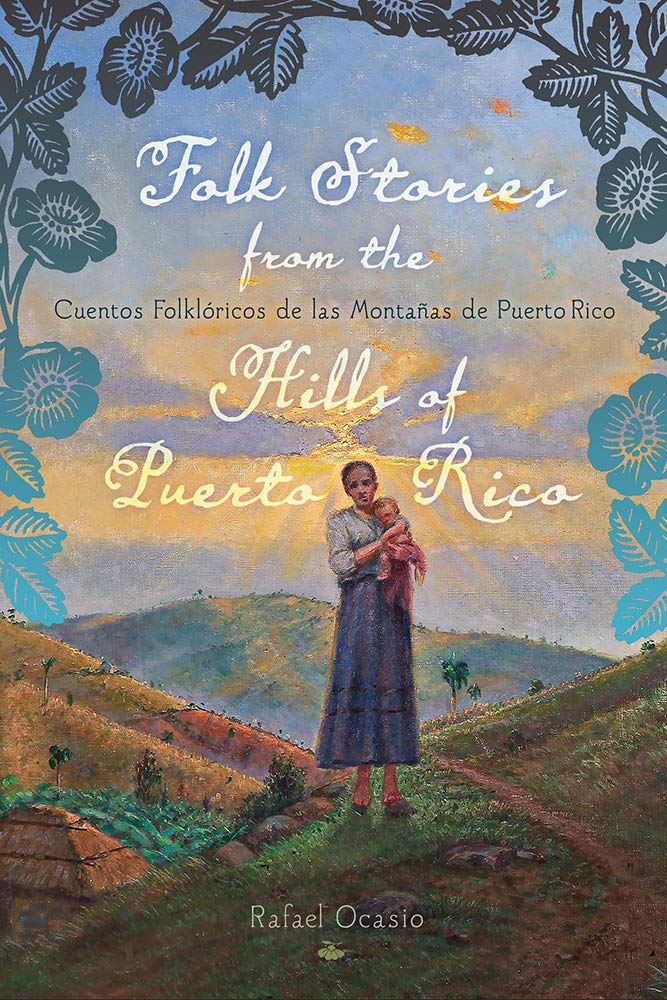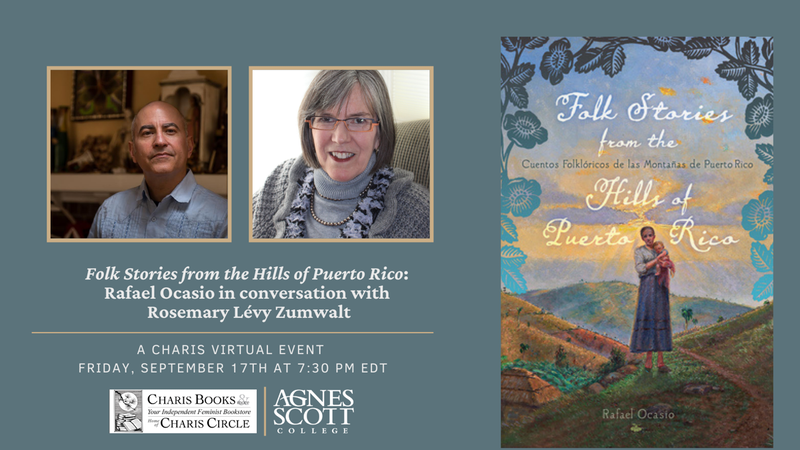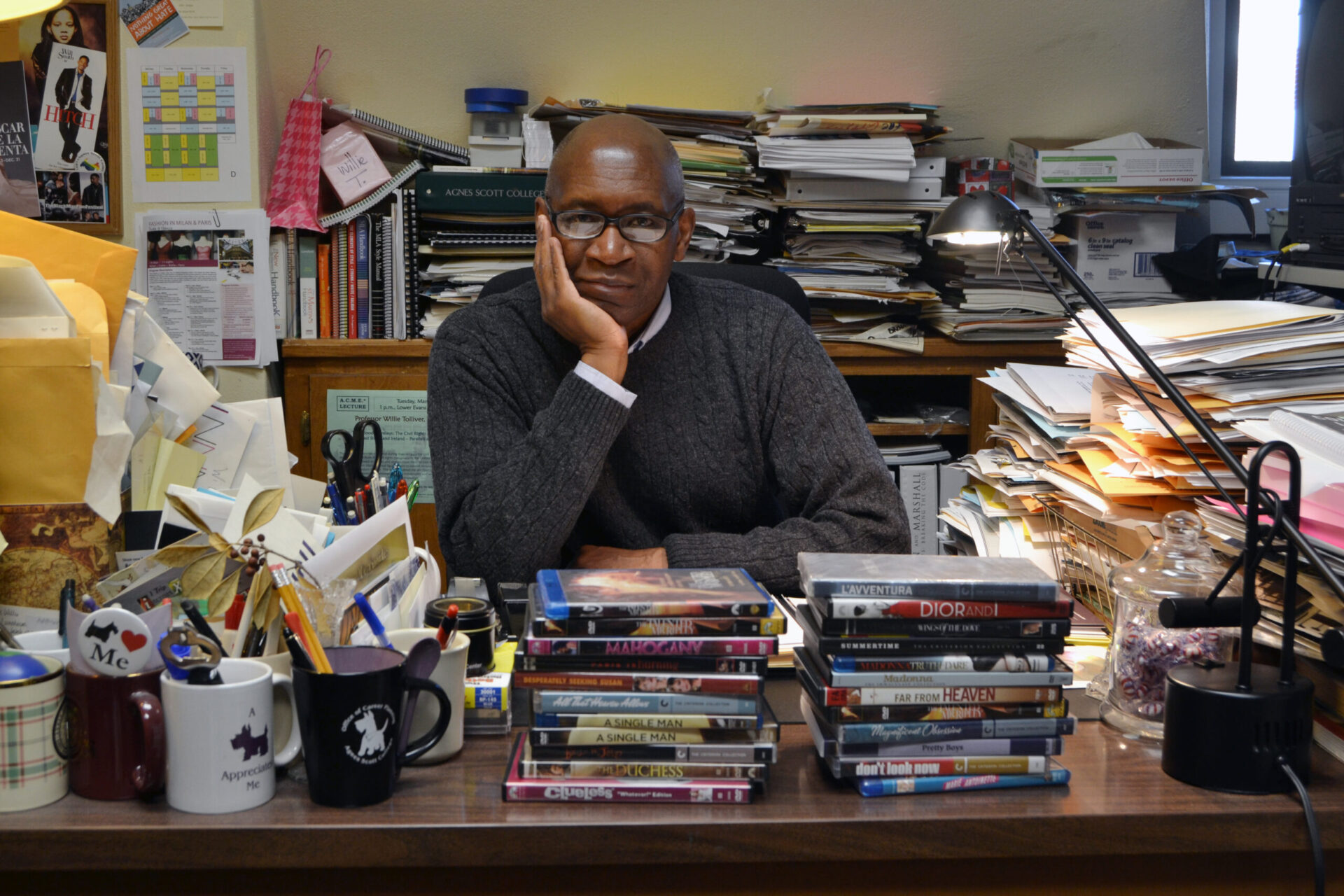
Folk Stories from the Hills of Puerto Rico: a conversation with Rafael Ocasio
It’s 4:00 on a Thursday afternoon the week before spring semester finals as a familiar face appears on my computer screen. Rafael Ocasio is smiling back at me in front of a virtual background of Old San Juan. His eyes are tired, filled with the same Zoom-induced fatigue we all have at this time of day, and semester, but his warmth and ease are the same and he’s already halfway through his greetings as his mic connects to the audio. It is good to see him. Rafa, as he allows us to affectionately call him, is one of those colleagues you genuinely miss in a pandemic. Referring to his prior publications, I ask, “What number is this, Rafa? 6?” “SEVEN,” he corrects, and then quips, “I have no life!” I eagerly ask him to tell me about his new bilingual anthology of Puerto Rican folktales. I’ve already noticed something I’m curious about- 4 of his 6 previous books are about Cuba. “This is my second coming out” he says with a laugh, “as a Puerto Rican!” This fact has apparently come as a surprise to more than one colleague and he cracks up as he tells me of an alarmed friend at a recent conference who, after admitting they had always thought he was Cuban, asked with concern, “But, you’re still queer, aren’t you??” Now we’re both cracking up. Rafa’s identity as an out faculty member on campus has been both an inspiration and a comfort to many of us and this moment of sharing has us both filled with giggles and solidarity.
I ask him what made him “come home to Puerto Rico” after years of writing nearly exclusively about figures in Cuba’s history. “This started 15 or 20 years ago, I was very good friends with the late poet, short story writer and novelist Judith Ortiz Cofer, who was the first Latina writer to be nominated for the Pulitzer Prize… we developed a working relationship where she would send me her writing to edit, to make sure the accents were correct and so forth… at some point she started sending me stories that she called “re-interpretations of Puerto Rican folktales.” I recognized them as versions of folk stories that I had read as a child, some of which I had heard from my grandmother.” This anthology of Puerto Rican folktales is a follow-up companion to his last book, published only last summer (Aug 2020), Race and Nation in Puerto Rican Folklore: Franz Boas and John Alden Mason in Porto Rico, which explores the historic research trip taken by the two anthropologists in 1915. With Puerto Rico having come under US military control less than 20 years prior, “the father of American anthropology” Boas intended to perform field research in the areas of anthropology and ethnography while other scientists explored the island’s natural resources. As Rafa explained, nearly by happenstance, Boas ended up in Puerto Rico, needing a place for his students to “play archeologists”, after Mexico’s Revolution proved that option unsafe. Boas supervised the young anthropologist Mason as he collected hundreds of oral folklore- stories, songs, ballads, and riddles, from the rural countryside. These stories were only published originally in The Journal of American Folklore, and many biographers ignore this work in favor of Boas’ other international contributions as a pioneering folklore scholar. Rafa and his former colleague, Vice President for Academic Affairs & Dean of the College Emerita and Professor Emerita of Anthropology Rosemary Lévy Zumwalt, who has also recently published a biography on Boas, both believe there was something else yet undiscovered that sent Boas on a path of such intentional and driven work. “There are hundreds and hundreds and hundreds of short stories- I knew one person could not have gathered that many samples on their own- and I uncovered that Mason trained teachers in the Public school system, who subsequently trained their students to write these stories down. So many of these stories were written by children- I assume that they were either elementary or intermediate age.” He then goes on to describe the concurrent efforts of the US controlled Puerto Rican government to mandate that the education system all be converted to English, as Boas and Mason were encouraging this celebration of the island’s folk culture and asking the teachers and students to write the stories in Spanish. “All of this convoluted mess is my book… I played two roles, first as a Puerto Rican who knew some of these stories as a child, and secondly, as scholar who’s looking at this political tension from the vantage point of the many years of colonial history between Puerto Rico and the United States. In short, I explored the presence of U.S. Americans on my island while imposing imperialist practices for the first time outside of the continental United States.”
After listening to him speak about the early and immediate exploitation of Puerto Rico under US federal mandates by scientists, researchers, and various government and private business entities, I ask Rafa how things are back home during the pandemic. “About the same as here, but the tourists are beginning to come back, and they are the ones that are challenging regulations.” He worries about the massive influx of people in the small streets and quarters of Old San Juan where his mother and sister live. As many as thousands of people can flood the tiny streets when a cruise ship docks. “Some things never change I guess?” He nods. remember Donald Trump throwing rolls of paper towels into a hapless crowd just after Hurricane Maria devastated the island in 2017. “How is it, living in both places? You go back quite often, yet you live and work here… what is that like, being both an American and a Puerto Rican?” “It feels like living in two different worlds and you are seeking ways to cohesively bridge them. Often I am successful, and it is a great experience, but sometimes the connections are not that clearcut.” I am reminded of his essay on identity and his scholarly process from Agnes Scott Dalton Gallery’s 2015 showing\thinking exhibition. He sighs in frustration. “It gets very hard, honestly. And the older I get, the harder it gets. Often I am in the position of defending the United States in Puerto Rico, when I really can’t because as you can see, that example (Trump) is just one very visual example of the many ways in which Puerto Ricans are mistreated. There are so many laws and regulations that are really very unfair…” He shakes his head and looks down.
I go back to the book. “What’s your favorite story in your anthology?” He smiles, and his eyes twinkle. “Cinderella,” he replies with teasing delight. I am incredulous! “Really? Why?” “Yes! You have to read them. There is no prince in most all of the versions. Cinderella has to find a way to deal with her stepmother and stepsister through magic, but the magic comes from three fairy godmothers. They give her gifts that help her.” I clap my hands in delight at this feminist retelling as he details the various gifts given and the ensuing jealousy of her stepsisters. (You have to read the stories to find out!) He goes on with others- tales of bandits and Robin Hood-esque pirates, the recurring supernatural elements throughout the tales and the deeper, difficult lessons within. “Children cannot trust adults, not even your own parents, because they can turn against you…You can be cursed by an evil person, that evil person can even be your parent, not really a mean-spirited parent, although there are some who really are, but sometimes a parent can curse you, without really meaning it. And then, the plot of the story is how do you come back to your normal self, a process that involves someone else who comes to your rescue as part of an adventure plot line for the rescuer who embarks on a rather difficult quest.” He also comments on how many of the women characters are very strong. But there is a darker layer as well- Rafa could not use many of the stories because of racism, misogyny, and homophobia. “So this is a curated collection of the cream of the crop, then?” I ask. He smiles, “Yes. These are the best! I know readers will like them because in the last years I have been reading some of them at Pasiones, a celebration of Latinx literature organized by our Latinas Unidas, student group. They also loved Cenizosa’s stories which highlight such an unusual female protagonist!” He eagerly added, “after you check out the book from McCain library, let me know if you’d like to chat about the stories. I’d love to hear what you think about them!”
Rafael Ocasio is the Charles A. Dana Professor of Spanish and Chair, and faculty fellow at the Gay Johnson McDougall Center for Global Diversity and Inclusion at Agnes Scott College in Decatur, Georgia. A Latin Americanist and literary historian, Ocasio’s books include: two biographies on the Marielito writer Reinaldo Arenas: Cuba’s Political and Sexual Outlaw and A Gay Cuban in Exile; Afro-Cuban Costumbrismo: From Plantations to the Slums, examines literary portraits of enslaved workers and freed Blacks in the 19th century Cuban literature, and A Bristol, Rhode Island, and Matanzas, Cuba, Slavery Connection: The Diary of George Howe, which examines archival documentation of an U.S. administrator of a Cuban sugar plantation as part of an active commercial trade between Cuba and Rhode Island throughout the early part of the nineteenth century.
Order this book from our community partner and campus bookstore: https://www.charisbooksandmore.com/book/9781978822986
Rafa will discuss this work with Rosemary Lévy Zumwalt in a virtual conversation hosted by our community partner and campus bookstore, Charis Books and More, on Friday, September 17 at 7 pm. Click here to learn more.




